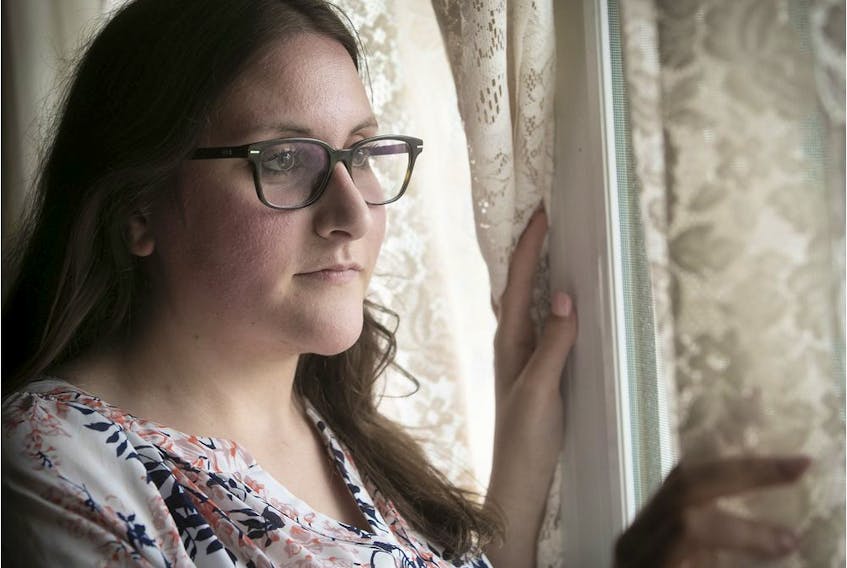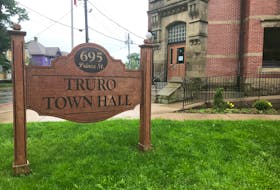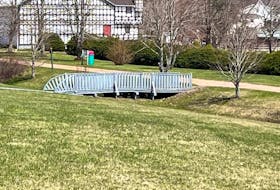Emilie Arshif used to think of herself as sitting on a bridge between two cultures; Québécois on one side and Islam on the other.
These days she feels like that bridge has become more of a fence.
“I fear that by the time my boys grow up, that fence will become a wall and they’ll be stuck on it,” Arshif says. “I am Muslim, yes, but I can also trace my French Canadian ancestry to the colonies. This debate over banning religious symbols has been crushing.”
Arshif converted to Islam 10 years ago when she married a man from Algeria. She says her faith is strong but that, unlike some Muslim women, she doesn’t wear the hijab.
Arshif, who is studying to be a librarian, would not be affected by Quebec’s newly adopted religious symbols ban, which forbids teachers, police officers and other government workers from wearing religious clothing on the job.
Even so, many of the Muslim women who chose not to wear a religious headscarf say the tone of the debate surrounding Quebec’s religious symbols law has caused them to re-examine their place within Quebec.
“I don’t want Quebec to be defined by the rights they remove from people,” Ashrif says. “People will say, if you’re defending your culture by taking away someone else’s, then that’s not much of a culture. I don’t think that’s true, I think Quebec has a vibrant culture. But I also understand how people could think that.”
Arshif says she was in the grocery store a week ago when a white man began yelling at a hijab-wearing woman. When she yelled, “What kind of a man are you?” back at him, she was kicked out of the grocery store, according to Arshif.
“What happens next? Where do we go from here?” Arshif said. “You have people saying, ‘Go back to your country’ and ‘You don’t belong here.’ I’m not saying things were ever perfect here, but I really don’t like where this is going.”
Zeina Salameh was born and raised in Laval. She says the loudest voices in the debate over Islam in Quebec are coming from non-Muslims.
“I go online and I read these comments from white men that say, ‘Finally, we’re freeing these women from oppression’,” Salameh says. “You’re not removing oppression, you’re not saving me, I don’t have a husband or a father telling me what to wear.
“When I tell people that, they say, ‘Well yeah, you’re the exception.’ That’s 100 per cent wrong.”
She says there are sub-cultures within Quebec’s Muslim community that are “more rigid” and that there can be coercion for some women to start wearing the hijab at 13. But, in Salameh’s experience, this is the exception rather than the rule.
Salameh, whose parents immigrated to Canada from Lebanon, doesn’t wear the hijab and neither does her mother. But her sister does and her decision, at 18 years old, to wear the headscarf wasn’t an easy one.
“On the one hand, my mother and I were proud of her for making that decision for herself,” Salameh says. “But I remember my father worrying about discrimination, worrying that it would limit her opportunities.
“People do say things to her, they confront her on the street about it. Luckily, it’s never gotten physical. But we worry. In the last few years, as things have gotten more tense, we tell her, ‘You know, if ever you don’t feel safe, you don’t have to wear it. You don’t have to face these hateful people.'”
Although Salameh doesn’t wear the hijab, she considers herself a person of faith. One day she may chose to don the headscarf, and that could cost her her job as a teacher and other opportunities.
“I was raised in Laval, I speak French, I’ve always considered myself at home here,” Salameh says. “I look white, so people sometimes treat me like one of them. It’s all fun and games until they forget you’re different and they start talking about other Muslims. And it’s ugly, it’s awful and in some way they’re talking about you too.
“Maybe Quebec isn’t for me. If this is what Quebec represents, then maybe I don’t belong here. And that’s sad because if I don’t belong here then where do I belong? I was born here, I was raised here, I never left here.”
As an artist and university professor, Saoussen Ouerghenni was living a comfortable life in Tunisia. But she came to Quebec in 2012 hoping to provide her children with opportunities that she never had.
“We look to Quebec and Canada as El Dorado, it’s a wonderland and we want to contribute to it in return for those freedoms and those rights that come with being a citizen here,” Ouerghenni says. “I have to say that I’m not affected by this law, I don’t wear the veil, but it hurts my heart. It’s fundamentally unkind.
“Sometimes people, they like talking to me — I’m a very social person — forget that I’m Muslim, that I’m Arabic and they’ll find out and say, ‘Oh my, I had no idea there were Muslims like you.’ Well of course there are, we’re all the same in one way or another. We have good intentions, we came here to be good citizens, to contribute, to prove ourselves.”
Arshif was not born into the faith and says her conversion to Islam gives her a somewhat unique perspective on the religion. She says Quebecers would gain a lot by keeping an open mind on the Muslim faith.
“In the Qur’an, something that comes up a lot is the idea of the path,” she says. “You’re not perfect, no one is perfect, you don’t have to follow every rule out there. But are you on the path? Are you honestly trying to be a better person?
“The other thing is your motivation. You can do all the right things but if you do it for the wrong reasons then it doesn’t matter. Just like, if you make some mistakes but if you were trying to do the right thing, it’s okay.
“Some people look at this religion like it’s an extreme ideology. For most of us, it’s just a guiding force teaching us to be kind, to be helpful, to care for others. That doesn’t strike me as fundamentalist.”
Copyright Postmedia Network Inc., 2019









